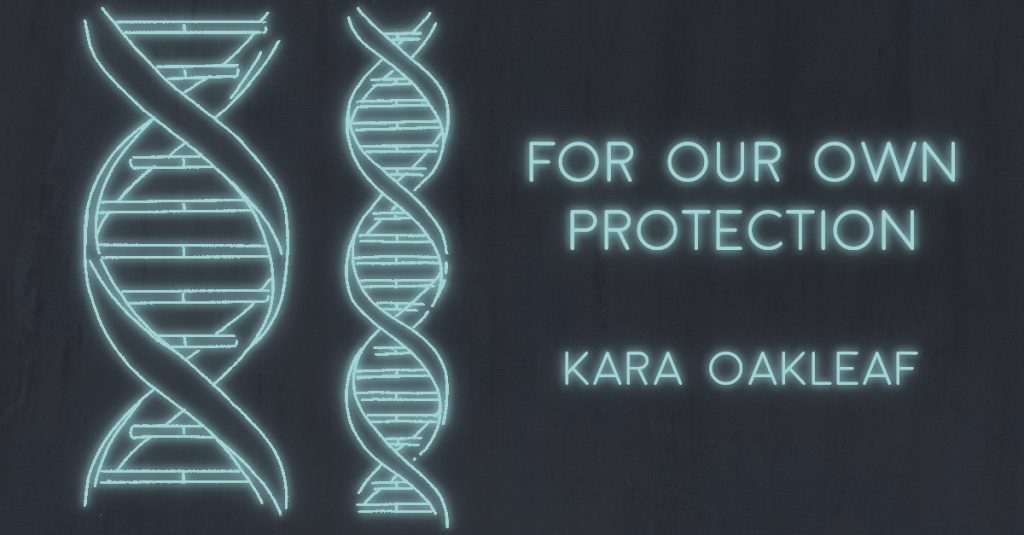After the white-hot blast flashed across the sky, after the air turned toxic and we all zipped ourselves up inside government-issued suits like garbage bags, our breath misting on the clear plastic squares that let us see through our hoods, I started watching Jay.
He’s always been across the street, as much a fixture as the maples lining the sidewalks before the flash, before everything burned and the trees became charred silhouettes. After school, Jay used to push the mower in neat rows across the front yard while I sat on the porch with my homework. That boy walking toward me and away from me over and over again, steady as a metronome. On the hottest days, he’d yank off his t-shirt and wrap it around his head, the fabric collapsing down on his shoulders like a waterfall.
These images come back to me now, things I’d barely noticed in all those years of living only a few steps away, but that were so much a part of the beautiful, ordinary before-time that they imprinted themselves into me. Now he’s hidden in that suit, and every small memory of his body shines like a ghost.
The suits didn’t come right away. Only in the weeks after the flash, after they tested us, made us breathe into glass test tubes and swabbed our skin. Just a precaution, they said. We closed the plastic casings around ourselves and listened to the plastic crinkle of our new footsteps.
When the lab results came back three weeks later, they told us the chemicals were a part of us now, stitched into our DNA. They’d watched the poison bloom under microscopes, and when they told us the toxicity grew on contact, that it would spread and strengthen each time we touched each other’s skin, no one was surprised. It didn’t take long, encased in those suits, to learn that everything needs touch to grow, that feeling another person’s fingers on your skin is like taking a breath after long minutes of being under water.
Most days, it’s too hot to sit on the porch. I wait at the windows to see if the singed branches of the maples will push out new buds, but nothing is blossoming here. Outside, heat rises from the sidewalks and makes waves in the air when I stare across the street from the front windows. Even the oxygen is melting, blurring Jay’s house into a kind of mirage. When he comes outside, I try to make out the shape of his body under all the layers that keep us alive.
At the end of our street, they installed sixteen steel showers, where we strip down behind heavy, bolted doors and stand under a rush of cold water. We’re supposed to use standard-issue washcloths that scrape us like sandpaper, but sometimes, I press my fingertips to my stomach, or to the soft spot on my neck where the blood pounds against my skin. The steady hum of a body, a pulse. I don’t know if my bare fingers against my own skin can grow the toxins, if these stolen moments of touch put me in more danger, but I can’t stop.
Inside the steel tube showers, I try to make out my reflection, a pale blur against the gray. It’s been months since I’ve seen myself in a mirror without the white plastic suit covering everything I once knew of myself, and I’m beginning to forget my own body.
And then one day, when I’m zipped back into my suit and step out of the showers back onto the street, I see another figure standing down the block, motionless and facing me. You’d think everyone looks the same in these suits, but I know the way he stands, the space his body takes up in the middle of our wrecked street. And now I know he’s been watching me, too.
It’s the middle of the night when I follow Jay through the neighborhood, toward the showers. In the dark, I can almost believe there was never a flash, that trees are only bare for a season, that the streetlights are only out because of a power surge, something temporary and fixable.
We slide the steel doors closed behind us and the sound of them closing is like the slice of a knife. His face is behind a cloud of breath until he pulls off the hood and then it’s like his skin is glowing and I don’t know if it’s the toxins or just the simple fact of a face, uncovered and inches away from me. It doesn’t matter, because when I’ve let my own suit fall down around me, I reach up and touch it, his cheeks on my palms and then his hands are on my waist and pulling me toward him.
And even though I’d never done this in the before-time, it feels like a memory. This is what skin feels like, this rush of heat, muscles contracting under a surface, a body itself as a kind of landscape, and whatever the flash in the sky has taken away from us, this landscape, these bodies are still here, breathing against each other and pulsing with something, either our own blood or something toxic that’s going to stop our breath sooner than we expect.
I listen for the sound of our own atoms splitting apart and dissolving back into each other because for just this moment, there’s something else white-hot melting and about to consume us, and this flash, this heat is our own making, and maybe something we can survive.
After, Jay turns on the cold water and we stand together shivering, goosebumps popping up on our skin like armor, something to protect against whatever we’ve just done to each other, what I already know, even as I breathe in the new danger that’s grown between us, we’ll do again, and again, and again.

